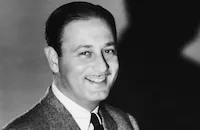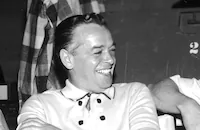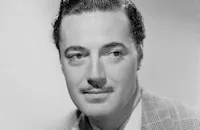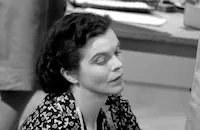Nocturne

Brief Synopsis
Cast & Crew
Edwin L. Marin
George Raft
Lynn Bari
Virginia Huston
Joseph Pevney
Myrna Dell
Film Details
Technical Specs

Synopsis
As playboy songwriter Keith Vincent callously ends an affair with a woman he calls Dolores while at the same time working on "Nocturne," his latest composition, he is shot and killed. Although Halberson, the head of the police investigation, later rules the death a suicide because Vincent's fingerprints are on the gun and powder burns appear on his hand, homicide detective Lieutenant Joe Warne is skeptical. While inspecting the crime scene, Joe notes that Vincent was still composing his song, which he had dedicated to "Dolores," when he died and kept a gallery of photographs of his lovers on his living room wall. After Vincent's servant, Eujemio, informs Joe that Vincent referred to all of his lovers as "Dolores," Joe questions the women in the photographs one by one. When the interviews yield nothing, Joe returns to Vincent's and notices a spot on the wall where a photograph had once been. Joe tracks the missing lover through a photographic studio run by a man named Shawn and interrogates the woman, Frances Ransom, at a swank swimming pool. Although Frances, a bit movie actress, gives Joe a detailed alibi, he quickly concludes that her story is a lie. Before Joe can follow up on his suspicions, however, he is suspended from the force for his brutish interrogation techniques. Unfazed by the suspension, Joe invites Frances to the Keyboard Club, where Frances' sister, Carol Page, sings. Joe asks pianist Ned "Fingers" Ford to play "Nocturne" and watches how Frances and Carol react to the tune. While Frances is nonplussed, Carol appears disturbed, and Joe decides to follow Carol home. There Carol admits that she heard Frances playing the song and knows that she was with Vincent on the night of his death. Carol also says that Frances removed her photograph a week before Vincent's demise, shortly after he had jilted her. Despite his growing attraction to Frances, Joe returns to her apartment and bluntly asks her "how she did it." Frances denies Joe's charges and permits Torp, Finger's hulking piano pusher, to beat him. At the police hospital, Joe runs into Susan Flanders, Vincent's ex-convict housemaid, who also has been badly beaten, but is unable to extract any information out of her. Joe's worldly mother, meanwhile, discusses the case at home with a friend and, while showing the friend how Vincent could not have been forced to shoot himself, accidentally fires a blank against Joe's temple. The accident convinces Joe that the powder burns on Vincent's hand could have been left by using his hand to fire a blank into the actual wound. Armed with this information, Joe corners Frances on a movie set, but is quickly turned away. Responding to a telephone message, Joe then goes to Shawn's studio, but finds the photographer's body hanging from the ceiling. He then rushes over to Frances' apartment and arrives in time to save her from gas asphyxiation. After Joe pockets a typed suicide note that implicates Frances in both Vincent's and Shawn's death, he returns to the Keyboard Club, where he and Torp fight. The victorious Joe then accuses Carol, whom he has discovered was also having an affair with Vincent, of murder. Carol pleads innocence, but is startled when a revived Frances enters the club. Eventually, Joe forces Fingers, who is secretly married to Carol, to confess that he killed Vincent out of jealousy, murdered Shawn to silence him and tried to kill Frances because she was about to unravel their scheme. In addition, Fingers admits that Torp beat up Susan because she was blackmailing Carol. As Fingers and Joe then struggle over Fingers' gun, the police arrive and arrest Fingers. Vindicated, Frances faces a happy future with Joe.

Director

Edwin L. Marin
Cast

George Raft
Lynn Bari

Virginia Huston

Joseph Pevney

Myrna Dell

Edward Ashley

Walter Sande
Mabel Paige
Bernard Hoffman
Queenie Smith
Mack Gray
Pat Flaherty
Lorin Raker
William Challee

Greta Grandstedt
Lillian Bond
Carol Forman
Robert Malcolm
Jim Pierce
Willie Bloom
Roger Creed
Ed Dearing
John Banner
Phil Baribault
Rudy Robles
Janet Shaw
Ted O'shea
Harry Harvey
Lee Frederick
Robert Andersen

William Wright
Broderick O'farrell
Virginia Edwards
Virginia Keiley
James Carlisle
Paul Stader
Antonio Filauri
Jack Norton
John Rice
Al Hill
Edward Clark

Dorothy Adams

Lillian Bronson
Gladys Blake
Sam Flint
Al Rhein
Benny Burt
Matt Mchugh
Lucille Casey
Donald Kerr
Dick Rush
Bert Moorehouse
George Goodman
Tex Swan
Betty Farrington
Mel Wixon
Connie Evans
Bob Terry
Doris Stone
Monya Andre
Betty Hill
Carol Donell
Eleanor Counts
Lloyd Dawson
Norma Brown
Crew
James Altwies
James Anderson
C. Bakaleinikoff
Robert Boyle
Rowland Brown
Edwin "buddy" Cole
Russell A. Cully
Albert S. D'agostino
Frank Fenton
Mort Greene
Jack J. Gross
Leigh Harline
Leigh Harline
Joan Harrison
Terry Kellum
Jonathan Latimer
Martha Mears
Harold Palmer
Renie
Barney Ruditsky
Eleanor Rudolph
Darrell Silvera
Jean L. Speak
Harry J. Wild
Elmo Williams

Videos
Movie Clip




Hosted Intro
Film Details
Technical Specs

Articles
Nocturne
Raft plays a detective who responds to the death of a pianist playboy. We know he was murdered -- while composing a tune, no less -- but the murderer has made it look like suicide. To the rest of the cops, it's an open-and-shut case, but Raft has a feeling that there's more to the incident, and he starts to uncover glimmers of evidence that might prove it. The pianist had a string of brunette ex-girlfriends, all with photos on his wall... and all of whom he called "Dolores." One of the photos is missing, that of Lynn Bari, who quickly becomes a primary suspect. But then there's also Bari's sister, played by Virgina Huston, as well as a sassy housekeeper, a suspicious nightclub worker, and another pianist all involved somehow. As Raft tracks them all down and interrogates them, he gets a little too aggressive, shoving around innocent citizens. This lands him in hot water with his captain, and soon he has to turn in his badge. Eventually, there's a virtual dragnet out to bring him back in as Raft presses on alone, roughing folks up while getting closer to solving the crime.
Nocturne never really explores the reasons for Raft's steadfast determination. This is not the brutal detective of Dana Andrews in Where the Sidewalk Ends (1950), or Robert Ryan in On Dangerous Ground (1952), two cops with real psychoses. Raft comes nowhere near their level of viciousness (outer or inner), and as a result Nocturne is a quieter, gentler kind of film noir. Perhaps Raft is closer to Dana Andrews in Laura (1944), another mystery with a tune and a portrait at its center. But those are mere surface comparisons. (There's another: Nocturne also has a turn from Queenie Smith, who played Gene Tierney's maid in Laura. In fact, one can imagine that this is the maid from Laura, at home when she's not working at Tierney's!)
In Nocturne, one can only assume that Raft is obsessive about this case because he's good at his job. The lack of a substantial subtext keeps Nocturne from approaching the mastery of the afore-mentioned other films, but it's still an absorbing picture -- and it's certainly film noir, with Raft operating in a night-time world full of danger, shadows and paranoia.
He also travels all over Los Angeles, and there's plenty of enjoyable location work on view. The best is a scene where Raft enters the gates of the actual RKO Studios, to further interrogate Lynn Bari on the set of a film her character is working on! It's in this sequence that Bari tells off Raft in one of Nocturne's best lines: "Who do you think will wind up behind the eight-ball? Me, or a cop who just got himself suspended? Now why don't you hop on your scooter, sonny boy, and blow? I've got to emote!"
Making the line even funnier is the fact that George Raft certainly does not emote much at all throughout this movie. He does get his own share of great lines, however, including this classic: "He had money... Dolores... a nice house. Only he apparently decided he needed a little more ventilation. So he put a hole through his head."
Raft speaks that line to his mother (Mabel Paige), with whom he lives and shares details of his casework. It's a weirdly entertaining part of the film, and reminiscent of the movies of Alfred Hitchcock, who loved mother characters. In one very delightful scene that just brims with Hitchcockian dark humor, Paige tries to solve the case with a lady friend as they discuss murder while preparing tea.
There actually is a Hitchcock connection to Nocturne: the presence of producer Joan Harrison. Harrison produced many of Hitchcock's movies and television shows, and she contributed -- credited and uncredited -- to his films' screenplays. She may well have had a hand in Nocturne's script, which is otherwise credited to Frank Fenton and Rowland Brown for the story, and to Jonathan Latimer for the screenplay. Latimer was one of the great film noir screenwriters, with such credits as The Glass Key (1942), They Won't Believe Me (1947), The Big Clock (1948), and Alias Nick Beal (1949).
Nocturne was directed by Edwin L. Marin, who begins the film with a truly extraordinary opening shot: a long traveling shot toward a house and through a window to a man playing the piano. There must be an optical dissolve in there somewhere, but this viewer couldn't detect it. It's an amazing achievement for the era.
Warner Archive has provided no extras on the DVD, but the film, while not remastered, looks and sounds perfectly acceptable.
By Jeremy Arnold

Nocturne
Nocturne
The film was one of George Raft's many attempts to lose his gangster image. Although he had grown up in "Hell's Kitchen" and got his first big break on screen as Paul Muni's sidekick in Scarface: The Shame of a Nation (1932), Raft was tired of being typecast as a murderous thug. It didn't help that he counted a few real-life gangsters, particularly Bugsy Siegel, among his circle of friends. His later career was hampered by his insistence on re-writing scripts, as he did with Nocturne, to make his characters even nicer than they had appeared on the page.
With Nocturne, he should have trusted management and left the script alone. The film was produced by Joan Harrison, one of only three female producers working at that time (the other two were Harriet Parsons, daughter of gossip columnist Louella Parsons, and Virginia Van Upp). Harrison came to film noir naturally. She had started in the industry in 1933 when Alfred Hitchcock hired her as a secretary. Gaining invaluable training from the master of suspense, she eventually rose to earn writing credits for such classics as Rebecca and Foreign Correspondent (both 1940). Then she broke out on her own as a producer with the classic film noir Phantom Lady (1944). She would eventually return to Hitchcock as producer of his long-running television series.
The cast of Nocturne was some kind of B-movie heaven, starting with leading lady Lynn Bari. She had earned the title "Queen of the Bs" while under contract to 20th Century-Fox, where she quickly established a common pattern for second-string actresses, playing supporting roles in A films and leads in the Bs. In A films, she was most often cast as the other woman, trying to steal leading men from the likes of Alice Faye (Hello, Frisco, Hello, 1943) and Linda Darnell (Sweet and Low-Down, 1944). In Bs, she always got her man, though it was usually lesser stars like Preston Foster and Raft. She even lost one real-life husband to an A-list actress when ex-hubby Sid Luft married Judy Garland.
Rounding out the cast were even more B movie stalwarts, including Mabel Paige, the poor man's Ethel Barrymore (she even played a role later taken over by Barrymore when Someone to Remember, 1943, was remade as Johnny Trouble in 1957), who played Raft's mother. Jack Norton assayed his usual type in a bit role as a drunk, while Virginia Huston, a promising actress ultimately relegated to playing Jane to Lex Barker's ape-man in Tarzan's Peril (1951), made her screen debut as a singer suspected of murder.
One of the few cast members to make it into top productions was Joseph Pevney, who played the deranged pianist Fingers. After a few more supporting roles in top films like Body and Soul (1947), with John Garfield, and Thieves' Highway (1949), with Richard Widmark, he moved into directing. Among his better-known films were Meet Danny Wilson (1952), with Frank Sinatra, and Man of a Thousand Faces (1957), starring James Cagney as Lon Chaney. Eventually, he switched to television, where he helmed several episodes of Bonanza and the classic The City on the Edge of Forever from the first season of the original Star Trek TV series.
Producer: Joan Harrison
Director: Edwin L. Marin
Screenplay: Jonathan Latimer
Based on an unpublished story by Frank Fenton and Rowland Brown
Cinematographer: Harry J. Wild
Art Director: Robert Boyle, Albert S. D¿Agostino
Score: Leigh Harline
Cast: George Raft (Lt. Joe Warne), Lynn Bari (Frances Ransom), Virginia Huston (Carol Page), Joseph Pevney (Fingers), Myrna Dell (Susan), Mabel Paige (Mrs. Warne), Queenie Smith (Queenie), Jack Norton (Drunk).
BW-87m.
by Frank Miller
Nocturne
Quotes
He was a ladykiller. But don't get any ideas. I ain't no lady.- Susan
Trivia
Notes
Nocturne was producer Joan Harrison's first assignment for RKO. According to a Hollywood Reporter news item, Harrison, a former associate of Alfred Hitchcock, also worked on the screenplay, but the exact nature of her contribution has not been determined. RKO borrowed Lynn Bari from Twentieth Century-Fox for the production. Hollywood Reporter news items note that filming was to take place "all over Hollywood," including the Pantages Theatre, Hollywood Studio Club and the intersection of Hollywood and Vine. Modern sources add that the film grossed $568,000 in profits.















